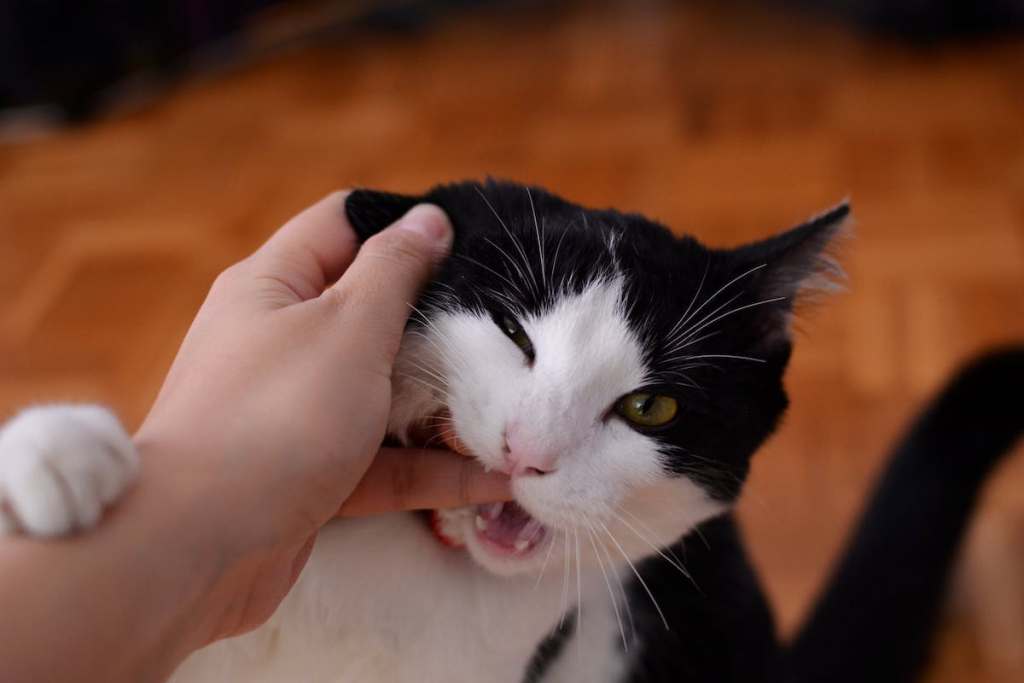Our animals love us, so why do your hands sometimes wind up in their mouths? Cats, in particular, have a knack for chomping at us for seemingly no reason. If you’ve ever gotten a bit of cat tooth, you know that it can hurt — both your feelings and your skin. Instead of panicking that your cat doesn’t love you, think instead about why your pet might behave this way and what you can do to fix it. We’ll take you through six reasons why your feline might nip you and what you can do about it.

Why does my cat bite me?
There are a whole host of reasons that your kitty may choose to nip you, some of which aren’t even a bad thing. Still, you may need to help your cat express their feelings in a healthier way by anticipating their needs and channeling their energy better, as required. Cat training is a thing if you get really stuck, but often shoring up the basics, like set meal times and plenty of mental stimulation, does the trick. Still, you have to understand the reasons behind the attack first.
Love
Oh, the infamous love bite. Frequently accompanied by kneading, you’ll know your cat has given you a gentle love nip if it’s a light mouthiness that doesn’t cause harm. You can also look to the other body language, which will communicate how happy they are to be around you.
Fear
We can picture what madder than an alley cat really looks like, so all of us know what a scaredy cat really means. That’s arched back, hissing, and spitting for starters. Some felines struggle with change, and you may recognize a fear response any time there’s a big shift in the household. That’s normal. The key here will be to get ahead of their anxiety by calming them down or giving them space.
Play
Many young animals play bite. When you have a kitten, some of this is expected, and you should redirect but not punish the behavior. One good way to communicate with them is by yelping, which is what their littermates would do if they were getting too rough with them. In addition, bringing home some toys can help both with general mouthiness and discourage them from getting close enough to chomp you.
Pain
We all lash out in pain sometimes, and cats do, too. You should pay particular attention if your animal has never bitten before, even in play, and then starts snapping or showing other signs of inappropriate aggression. Older beasties, in particular, can suddenly exhibit new behaviors due to pain or underlying conditions like cognitive decline. For this one, the solution is always a trip to the vet for a full workup.
Hunger
You probably don’t want your furry friend to bite your feet every time they want dinner. It certainly gets annoying after a while. Remember that some of this is innate, meaning they have an instinct to kill before eating. However, you can certainly work on training them out of the behavior. Try feeding at set times or using an automatic feeder. Once your mouser knows that you aren’t the one doling out meals, they’ll turn their attention elsewhere for pre-dinner nibbles.
Petting
Lots of cat owners have had this experience: You’re petting your sweet angel and then they suddenly attack you. Most likely, this is why kitties have a reputation for biting for no reason. But actually, there is something behind it. Cats can become overstimulated by affection, especially if it’s concentrated in one area, and may lash out. The best way to get ahead of this is to know where your pet doesn’t want to be touched and avoid it.

What should I do after I’m bitten?
Getting to the bottom of your cat’s issue won’t make the bite go away. If no skin has been broken, you likely just need to wash the area and attend to your animal’s training. However, your cat’s mouth can be a source of germs, and infection is always a worry. Pasteurella multocida, in particular, frequently travels in kitty spit and will cause problems for you, even serious ones, if left untreated. Start by washing no matter what. If you don’t suspect an issue, you can try just using ointment and a bandage. Watch for signs of infection like redness, swelling, and discharge. If you spot any of those, you’ll have to take yourself to see a doctor and get it checked out.
The stereotype might say that cats bite without provocation, but the truth is they really shouldn’t. Most happy, healthy, well-trained cats keep their mouths to themselves. By staying consistent and intervening early, you can set your feline up for success and ensure that you don’t get your hands snatched at.




